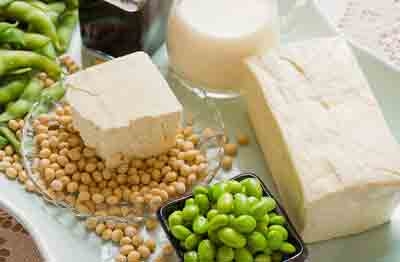Antioxidants in soy protein may help protect against heart disease
Diet and lifestyle choices are major factors contributing to the risk of cardiovascular disease, which is responsible for more deaths in the United States than any other cause.
One dietary component that has received considerable attention for its potential heart-protective effects is soybeans, which contain lean vegetable protein, dietary fiber and antioxidants called isoflavones.
In a recent issue of the University of California’s California Agriculture journal, scientists reviewed research concerning the relationship between soy and heart disease. Several potential mechanisms have been identified for the observed cardioprotective effects of soy, including cholesterol-lowering properties, antioxidant activity and gene regulation.
“Soybeans and foods made from soy are the major source of isoflavones, which serve as antioxidants, scavenging and neutralizing free radicals that might otherwise cause inflammation and increase the risk of heart disease,” wrote Emily R. Cena, senior writer, and Francine M. Steinberg, professor and chair of the UC Davis Department of Nutrition.
Soy acts like compounds similar to the hormone estrogen, such as blood vessel dilation and gene regulation. “Some health concerns have been raised related to soy's estrogenlike properties, particularly with regard to breast cancer risk, but these concerns were beyond the scope of the current article,” the authors wrote.
The preponderance of research shows that soy isoflavones increase levels of cardioprotective HDL (“good”) cholesterol and decrease levels of LDL (“bad”) cholesterol, thereby lowering the risk of heart disease. Soy may also help ameliorate metabolic syndrome, a constellation of risk factors including abdominal obesity, high blood pressure, insulin resistance and alterations in blood lipids that result in increased risk of heart disease and type 2 diabetes.
A current research project funded by the UC Davis Center for Health and Nutrition Research is investigating the effects of consuming whole soy foods on biomarkers of cardiovascular risk in individuals with metabolic syndrome; it may be completed in 2012.
“Soy isoflavones have a broad variety of biological actions,” Cena and Steinberg wrote. “The beneficial effects of soy are modest compared to pharmacological treatment, such as statin drugs. However, the cumulative effects over a lifetime are likely to be significant.”
The authors highlight epidemiological studies suggesting that Asian populations consuming large amounts of soy have lower rates of cardiovascular disease than Western populations. For example, in the mid-1990s a meta-analysis of 29 clinical trials found that compared to animal protein, soy protein significantly reduced blood levels of several fats (total cholesterol, LDL cholesterol and triglycerides). This prompted the U.S. Food and Drug Administration to approve the current health claim that 25 grams of soy protein per day, as part of a diet low in saturated fat and cholesterol, may reduce the risk of heart disease.
The review article on soy and heart health was featured in a special issue of California Agriculture journal, “Food as medicine: Can what we eat help cure what ails us?”


Posted by Pinoy Technologies on November 7, 2011 at 1:21 AM